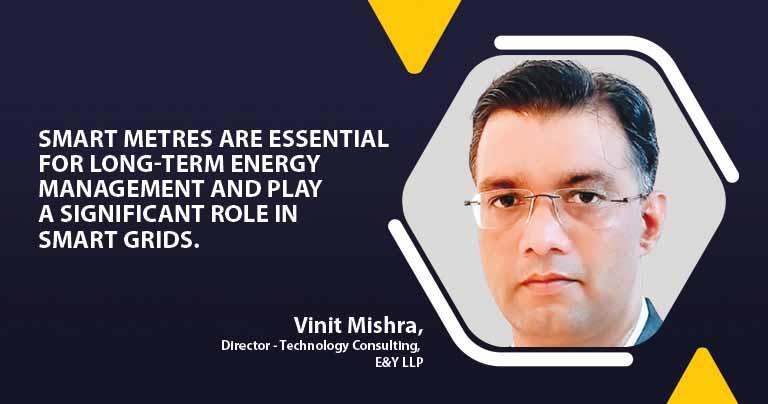Smart meters are inevitable for an integrated and electrified future
By EPR Magazine Editorial February 4, 2022 6:27 pm IST
By EPR Magazine Editorial February 4, 2022 6:27 pm IST

Vinit Mishra, Director – Technology Consulting, E&Y LLP, In an Interview with EPR magazine
Evolution of smart meters in India
Smart metering in India is progressing fast and gaining momentum. More than 3 million smart metres have been deployed throughout India so far. India is estimated to install 250 million smart metres by 2026, and is estimating to make an investment of around ₹1.5 lakh crore in the next three years. This is driven by various initiatives taken by the government of India to improve the financial health of DISCOMs.
The government is also encouraging DISCOMs to install pre-paid smart metres in order to generate more revenue. Considerable steps are being taken to accelerate smart-metering roll-out in India, such as improving the supply chain system and metre availability for ramping up smart-meter production.
Following are some of the critical factors that must be considered for the successful implementation and completion of a smart metre roll out project:
Private and state DISCOMs response to smart metering
In states like Delhi, Mumbai, and West Bengal, private DISCOMs are well-positioned. They are already more operationally efficient than state DISCOMs and do not require government financial assistance. The average ACS-ARR disparities have narrowed in private DISCOMs, indicating higher revenue levels.
State DISCOMs, on the other hand, exhibit a slower rate of operational progress and a staggered approach to meeting national targets for AT&C
losses and ACS-ARR gaps. Since a result of this situation, smart metering implementation in India is moving at a slower rate, as state DISCOMs face budgetary constraints in implementing such largescale, high-cost initiatives.
Private DISCOMs would prefer a CapEx-based smart metering deployment for a speedier roll-out, whereas State DISCOMs would prefer a TotEx or OpEx-based approach to lessen the financial burden, depending on the availability of Centre or State financing. Furthermore, the expenditure required to deploy new technologies linked with smart metering, which will result in DISCOM digitisation, is significant and cannot be carried only by state DISCOMs without government budgetary help. As a result, smart metering rollout in India has been slow.
Smart meters are inevitable for a smart electricity infrastructure
One of the most important components of the smart grid architecture is smart metering. Smart metres are enhanced versions of traditional electronic metres that include built-in two-way communication capabilities. By offering a bi-directional flow of data from utilities to consumers and vice versa, the smart grid concept enhances power use efficiency. When smart metres gather user data in real time, this is possible. This information is shared among utilities in order for them to process consumer billing data and analyse electrical factors in order to make decisions. Unlike conventional electronic meters, smart metres can measure consumed energy and power demand and have the capability to calculate derived electrical parameters like power factor, send alerts like tamper events to the utility and even have an in-built memory to store data for power blackouts as well. Smart metres include switches that allow utilities to remotely connect and disconnect users’ power supplies.
We use cookies to personalize your experience. By continuing to visit this website you agree to our Terms & Conditions, Privacy Policy and Cookie Policy.